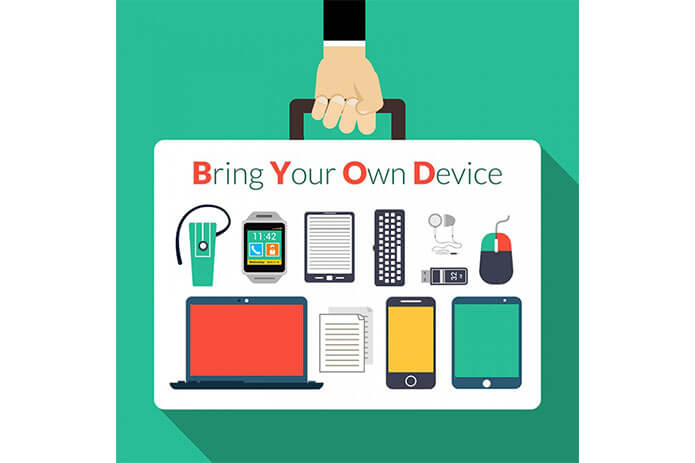The bring-your-own device (BYOD) trend has been prevelant since approximately 2008, and what many initially thought was a passing fad has now become a mainstay of the business environment. The consumerization of IT began with employees bringing their personal smart phones and PDAs into the workplace. It has rapidly expanded during the past few years to include non-IT delivered technology of all types: devices, software, online services, data, subscriptions, etc. What began as BYOD could now be more appropriately described as “ BYO Everything. ”
The implication of the BYO-everything trend is far-reaching and impacts both the relationship of users to their technology and the way companies must think about IT. From an employee perspective, the consumerization of IT is blurring the lines between the work environment and home environment. One is blending into the other to the point that the boundaries are no longer distinguishable and the technology, data and experiences are now fully intertwined.
Users select their own IT components from the open market based on the activities they must perform, their personal preferences and subjective perceptions of what will best align with their needs. Company data and personal data are often no longer perceived as separate, and intermingling is common. Overall, employees perceive the freedom of BYO Everything as a good development – particularly members of the Millennial generation who don’t like employers dictating their tools and methods.
For companies, BYO everything is more problematic and complicated. Employees are more productive using the tools they select individually, and many IT departments are now able to shed the expense of company-paid cellular phones, and even laptops, for example. Conversely, the corporate mandate for security, compliance, cost management and consistent user experience is becoming increasingly difficult for IT organizations to control. Time and the natural evolution of IT policies and standards will overcome many of these challenges. IT operational data, however, is a new issue, which iwill prove more difficult to resolve and of critical importance during the future.
For CIOs and IT leaders to make informed decisions on infrastructure, business process enhancements, support contracts, security and compliance assurance, they need a clear and accurate picture of the technology in use within the company. BYO Everything and the consumerization of IT is creating a situation where the technology landscape is continuously changing and the definition of what is company-controlled vs. employee personal technology is almost completely obscured. Previously, creating an Inventory of employee-provided devices was somewhat manageable, due to the small number of device types and operating systems. With component diversity increasing, even discovery applications don’t have the capabilities to address all tasks.
Addressing the BYO-Everything diversity challenge will require IT departments to adopt new techniques to survey the technology environment. IT departments will have to use a variety of “enhanced” discovery tools in addition to traditional ITSM and operations management tools, and then combine the data to develop a composite picture of the IT landscape. The challenge will not only be in discovery (as the changing landscape reveals new limitations everyday), but also in the integration of IT operational data to create the composite picture. Gaps, redundancies, conflicting information, real-time changes in the environment and usage context will all have to be reconciled to create a picture that is trustworthy and useful for decision making.
Blazent is an industry leader in data quality management solutions for IT operational data, with extensive experience integrating diverse datasets and improving the overall IT operational data picture to enable informed decision making. To learn how Blazent can help your company overcome the challenges of BYO Everything, read the Digital Transformation white paper here, or contact us directly at sales@blazent.com.
